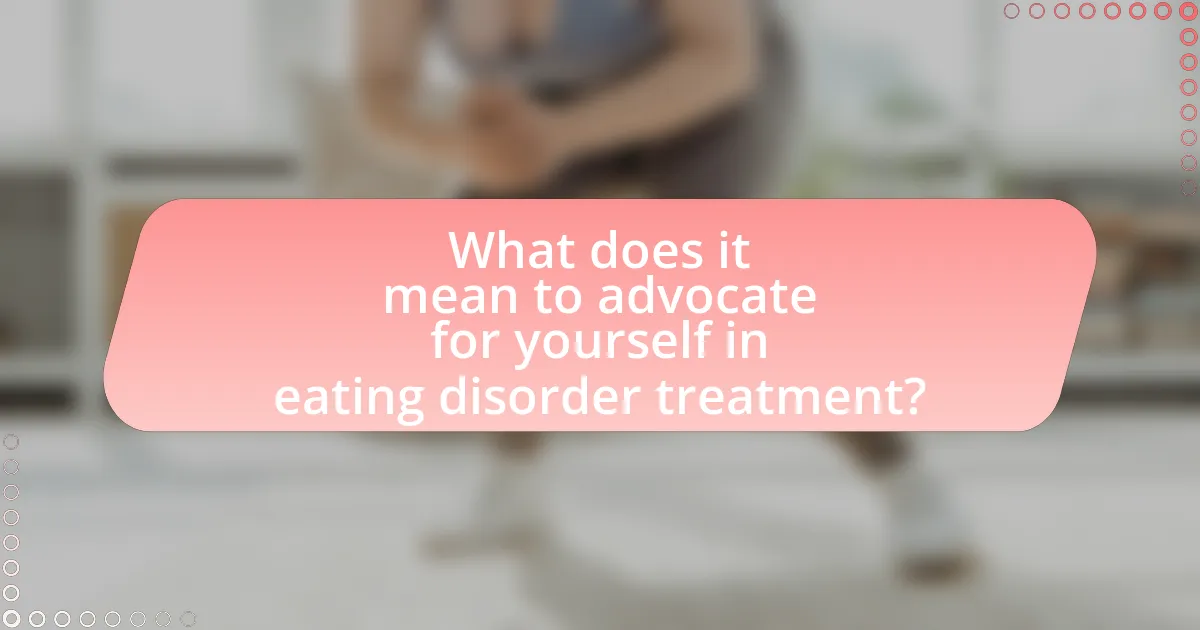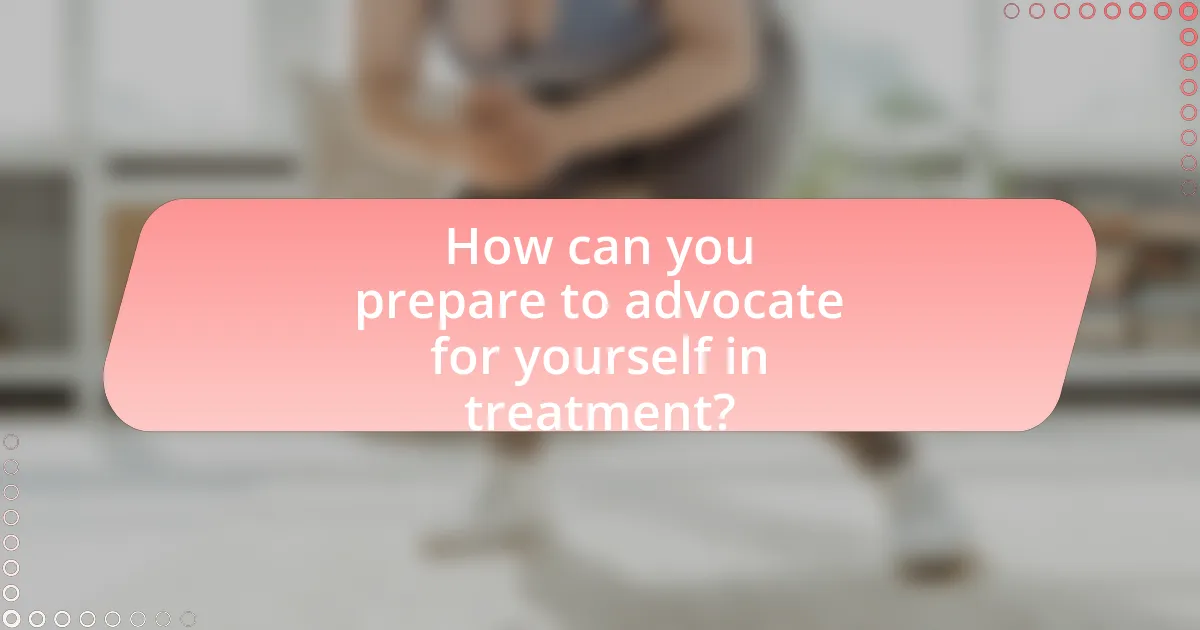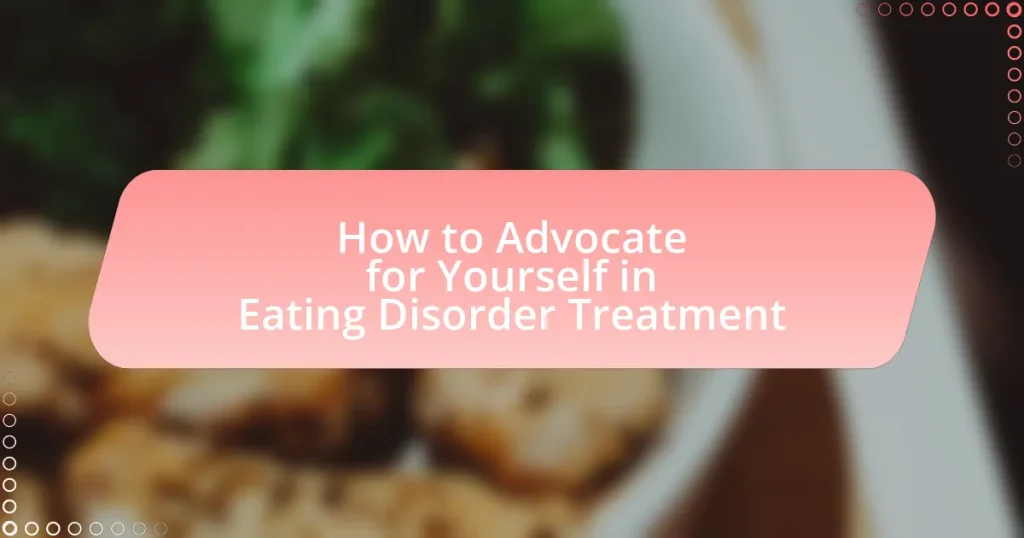The article focuses on the importance of self-advocacy in eating disorder treatment, emphasizing how individuals can effectively communicate their needs, preferences, and concerns to healthcare providers. It outlines the significance of self-advocacy in enhancing treatment outcomes, building therapeutic relationships, and improving patient satisfaction. Key principles of self-advocacy, such as understanding one’s rights and effective communication, are discussed alongside practical strategies for preparing for treatment sessions and overcoming challenges. The article also highlights the emotional barriers that may hinder self-advocacy and offers coping strategies to manage these emotions, ultimately aiming to empower individuals in their recovery journey.

What does it mean to advocate for yourself in eating disorder treatment?
Advocating for yourself in eating disorder treatment means actively communicating your needs, preferences, and concerns to healthcare providers to ensure that your treatment aligns with your personal goals and values. This involves expressing your feelings about the treatment process, asking questions, and seeking clarification on aspects of your care. Research indicates that self-advocacy can lead to improved treatment outcomes, as individuals who engage in their care are more likely to adhere to treatment plans and experience positive changes in their health (National Eating Disorders Association, 2021).
Why is self-advocacy important in the context of eating disorder treatment?
Self-advocacy is crucial in the context of eating disorder treatment because it empowers individuals to communicate their needs, preferences, and concerns effectively. This active participation enhances treatment outcomes, as research indicates that patients who engage in self-advocacy are more likely to adhere to treatment plans and report higher satisfaction with their care. A study published in the Journal of Eating Disorders found that self-advocacy skills correlate with improved recovery rates, highlighting the importance of patients taking an active role in their treatment journey.
How can self-advocacy impact treatment outcomes?
Self-advocacy significantly enhances treatment outcomes by empowering individuals to actively participate in their care decisions. When patients articulate their needs, preferences, and concerns, they foster better communication with healthcare providers, leading to tailored treatment plans that align with their specific circumstances. Research indicates that patients who engage in self-advocacy report higher satisfaction with their treatment and improved adherence to prescribed therapies, which correlates with better recovery rates. For instance, a study published in the Journal of Clinical Psychology found that individuals who practiced self-advocacy in eating disorder treatment experienced a 30% increase in treatment adherence compared to those who did not. This evidence underscores the critical role self-advocacy plays in achieving positive health outcomes.
What role does self-advocacy play in building a therapeutic relationship?
Self-advocacy plays a crucial role in building a therapeutic relationship by empowering individuals to express their needs, preferences, and concerns effectively. When clients engage in self-advocacy, they foster open communication with their therapists, which enhances trust and collaboration. Research indicates that clients who actively participate in their treatment decisions report higher satisfaction and better outcomes, as they feel more in control of their recovery process. This active involvement not only strengthens the therapeutic alliance but also encourages a more personalized approach to treatment, ultimately leading to improved mental health outcomes.
What are the key principles of self-advocacy in treatment?
The key principles of self-advocacy in treatment include understanding one’s rights, communicating effectively, and actively participating in decision-making regarding care. Understanding one’s rights empowers individuals to seek appropriate treatment and ensures they are informed about their options. Effective communication involves expressing needs, concerns, and preferences clearly to healthcare providers, which fosters a collaborative relationship. Active participation in decision-making allows individuals to take ownership of their treatment plans, leading to better outcomes. These principles are supported by research indicating that patients who engage in self-advocacy experience improved satisfaction with care and better adherence to treatment protocols.
How can understanding your rights enhance self-advocacy?
Understanding your rights enhances self-advocacy by empowering individuals to assert their needs and make informed decisions regarding their treatment. When individuals are aware of their legal rights, such as the right to receive appropriate care and to participate in treatment planning, they can effectively communicate their preferences and concerns to healthcare providers. Research indicates that patients who understand their rights are more likely to engage actively in their treatment process, leading to improved outcomes. For instance, a study published in the Journal of Health Communication found that informed patients are more likely to adhere to treatment plans and report higher satisfaction with their care. This knowledge not only fosters confidence but also helps individuals navigate the healthcare system more effectively, ensuring they receive the support necessary for recovery.
What skills are essential for effective self-advocacy?
Effective self-advocacy requires strong communication skills, assertiveness, and self-awareness. Communication skills enable individuals to express their needs and concerns clearly, while assertiveness helps them to stand firm in their beliefs and rights without being aggressive. Self-awareness allows individuals to understand their own feelings, strengths, and limitations, which is crucial in articulating their needs effectively. Research indicates that individuals who possess these skills are more likely to engage actively in their treatment and achieve better outcomes, as they can effectively convey their experiences and preferences to healthcare providers.

How can you prepare to advocate for yourself in treatment?
To prepare to advocate for yourself in treatment, gather relevant information about your condition and treatment options. Understanding your eating disorder, including its symptoms and effects, allows you to communicate your needs effectively. Researching treatment modalities, such as cognitive-behavioral therapy or nutritional counseling, equips you with knowledge to discuss potential approaches with your healthcare provider. Additionally, documenting your experiences, including triggers and emotional responses, provides concrete examples to support your case. Studies show that patients who actively participate in their treatment decisions report higher satisfaction and better outcomes, reinforcing the importance of self-advocacy in healthcare settings.
What steps should you take before your treatment sessions?
Before your treatment sessions, you should prepare by gathering relevant information about your eating disorder, including symptoms, triggers, and any changes in your condition. This preparation allows you to communicate effectively with your treatment team. Additionally, you should set specific goals for each session, which helps to focus the discussion and track progress. Research indicates that patients who actively participate in their treatment planning are more likely to achieve better outcomes, as they feel more empowered and engaged in their recovery process.
How can you identify your needs and goals for treatment?
To identify your needs and goals for treatment, begin by reflecting on your personal experiences and symptoms related to your eating disorder. This self-assessment helps clarify what specific challenges you face, such as emotional distress, physical health issues, or social impacts. Next, set measurable and achievable goals, such as improving your relationship with food, increasing your body awareness, or enhancing your emotional well-being. Research indicates that individuals who articulate clear treatment goals are more likely to experience positive outcomes, as goal-setting fosters motivation and accountability in the therapeutic process.
What resources can help you prepare for discussions with your treatment team?
To prepare for discussions with your treatment team, utilize resources such as treatment manuals, support groups, and educational websites focused on eating disorders. Treatment manuals provide structured information about various therapies and approaches, helping you understand what to expect and how to communicate your needs effectively. Support groups offer shared experiences and insights from others facing similar challenges, which can empower you to articulate your concerns and preferences. Educational websites, such as the National Eating Disorders Association, provide evidence-based information that can enhance your understanding of your condition and treatment options, enabling you to engage in informed discussions with your team.
How can you communicate effectively with your treatment providers?
To communicate effectively with your treatment providers, be clear and honest about your symptoms, concerns, and treatment goals. This clarity fosters a productive dialogue, allowing providers to tailor their approach to your specific needs. Research indicates that effective communication improves treatment outcomes; for instance, a study published in the Journal of General Internal Medicine found that patients who actively engaged in discussions with their healthcare providers reported higher satisfaction and better adherence to treatment plans. Therefore, preparing questions in advance, actively listening, and providing feedback can enhance the communication process and ultimately support your advocacy in eating disorder treatment.
What strategies can help you express your concerns and preferences?
To effectively express your concerns and preferences in eating disorder treatment, utilize clear communication strategies such as active listening, assertive expression, and preparation. Active listening involves fully engaging with healthcare providers to understand their perspectives, which fosters a collaborative environment. Assertive expression allows you to communicate your needs confidently without aggression, ensuring your voice is heard. Preparation entails outlining your concerns and preferences beforehand, which can help articulate your thoughts clearly during discussions. Research indicates that patients who actively participate in their treatment decisions report higher satisfaction and better outcomes, highlighting the importance of these strategies in advocating for oneself.
How can you ask for clarification on treatment plans and recommendations?
To ask for clarification on treatment plans and recommendations, directly approach your healthcare provider and express your need for more information. You can say, “I need clarification on my treatment plan because I want to fully understand the steps and their purposes.” This approach encourages open communication and demonstrates your commitment to your health. Research indicates that patients who actively engage in discussions about their treatment are more likely to adhere to their plans and achieve better outcomes.

What challenges might you face while advocating for yourself?
While advocating for yourself in eating disorder treatment, you may face challenges such as lack of support from healthcare professionals, difficulty in articulating your needs, and internalized stigma. Healthcare professionals may not always recognize the importance of patient advocacy, leading to dismissive attitudes or inadequate responses to your concerns. Additionally, articulating specific needs can be challenging due to the emotional and psychological complexities associated with eating disorders, which may hinder effective communication. Internalized stigma can also create barriers, as feelings of shame or guilt may prevent you from expressing your needs confidently. These challenges can significantly impact the effectiveness of your advocacy efforts in treatment settings.
How can you overcome resistance from treatment providers?
To overcome resistance from treatment providers, establish open communication and express your needs clearly. Engaging in a respectful dialogue allows you to articulate your concerns and preferences, which can help providers understand your perspective. Research indicates that effective communication between patients and healthcare providers leads to better treatment outcomes, as highlighted in a study published in the Journal of Health Communication, which found that patients who actively participate in discussions about their care are more likely to adhere to treatment plans. By fostering a collaborative relationship, you can reduce resistance and enhance your treatment experience.
What techniques can help you handle pushback or dismissal?
To handle pushback or dismissal effectively, assertive communication techniques are essential. These techniques include using “I” statements to express feelings and needs clearly, maintaining a calm and composed demeanor to convey confidence, and actively listening to the other party’s concerns to foster understanding. Research indicates that assertive communication can lead to more productive conversations and better outcomes in conflict situations, as it encourages open dialogue and reduces defensiveness. For instance, a study published in the Journal of Counseling Psychology found that individuals who practiced assertive communication reported higher satisfaction in interpersonal relationships, which can be particularly beneficial in treatment settings.
How can you maintain your confidence in the face of challenges?
To maintain confidence in the face of challenges, individuals should focus on self-affirmation and setting realistic goals. Engaging in positive self-talk reinforces belief in one’s abilities, while breaking down larger challenges into manageable tasks helps create a sense of accomplishment. Research indicates that self-affirmation can reduce stress and improve performance, as shown in a study published in the journal Psychological Science, which found that individuals who practiced self-affirmation were more resilient in challenging situations. Additionally, surrounding oneself with supportive peers and professionals can provide encouragement and validation, further bolstering confidence during difficult times.
What emotional barriers might hinder your self-advocacy?
Emotional barriers that might hinder self-advocacy include fear of rejection, low self-esteem, and feelings of guilt or shame. Fear of rejection can prevent individuals from expressing their needs or concerns, as they may worry about negative responses from healthcare providers or peers. Low self-esteem can lead to doubts about one’s worthiness to advocate for oneself, making it difficult to assert needs effectively. Additionally, feelings of guilt or shame related to the eating disorder can create internal conflicts, causing individuals to suppress their voices in treatment settings. These emotional barriers significantly impact the ability to communicate effectively and advocate for necessary support in eating disorder treatment.
How can fear or anxiety affect your ability to speak up?
Fear or anxiety can significantly hinder your ability to speak up by causing physical and psychological barriers. When experiencing fear or anxiety, individuals may encounter symptoms such as increased heart rate, sweating, or trembling, which can lead to avoidance of speaking situations. Additionally, anxiety can create negative thought patterns, such as self-doubt or fear of judgment, which further inhibit the willingness to express oneself. Research indicates that individuals with social anxiety disorder often struggle to communicate effectively, as they may anticipate negative outcomes from speaking up, leading to a cycle of silence and unaddressed needs.
What coping strategies can help you manage these emotions?
Coping strategies that can help manage emotions during eating disorder treatment include mindfulness practices, cognitive restructuring, and support networks. Mindfulness practices, such as meditation and deep breathing, have been shown to reduce anxiety and improve emotional regulation, as evidenced by a study published in the Journal of Clinical Psychology, which found that mindfulness-based interventions significantly decreased emotional distress in individuals with eating disorders. Cognitive restructuring involves identifying and challenging negative thought patterns, which can lead to improved emotional responses; research indicates that cognitive-behavioral therapy effectively reduces symptoms of eating disorders by altering these cognitive distortions. Additionally, engaging with support networks, such as therapy groups or trusted friends, provides emotional validation and encouragement, which is crucial for recovery, as highlighted in findings from the International Journal of Eating Disorders that emphasize the importance of social support in treatment outcomes.
What are some practical tips for effective self-advocacy in eating disorder treatment?
Effective self-advocacy in eating disorder treatment involves clearly communicating your needs and preferences to healthcare providers. Start by preparing specific questions and concerns before appointments to ensure you address all relevant issues. Actively participate in treatment decisions by expressing your feelings about different approaches and therapies. Document your progress and setbacks to provide concrete examples during discussions with your treatment team. Researching your condition can empower you with knowledge, enabling you to engage in informed conversations. Additionally, seeking support from trusted friends or support groups can bolster your confidence and provide validation. These strategies enhance your ability to advocate for yourself effectively in the treatment process.
How can you create a supportive network to aid your advocacy efforts?
To create a supportive network that aids advocacy efforts in eating disorder treatment, individuals should actively engage with like-minded peers, professionals, and organizations. Building relationships with support groups, mental health professionals, and advocacy organizations can provide essential resources and emotional backing. Research indicates that social support significantly enhances recovery outcomes in individuals with eating disorders, as highlighted in a study published in the Journal of Eating Disorders, which found that peer support leads to improved coping strategies and reduced feelings of isolation. By fostering connections within these communities, individuals can share experiences, access valuable information, and collaborate on advocacy initiatives, thereby strengthening their efforts in promoting awareness and effective treatment options.
What role does journaling play in enhancing your self-advocacy skills?
Journaling plays a crucial role in enhancing self-advocacy skills by providing a structured way to reflect on personal experiences and emotions. This practice allows individuals to articulate their thoughts, identify their needs, and clarify their goals, which are essential components of effective self-advocacy. Research indicates that expressive writing can lead to improved emotional regulation and self-awareness, both of which are vital for advocating for oneself in treatment settings. For instance, a study published in the Journal of Clinical Psychology found that individuals who engaged in regular journaling reported greater clarity in their thoughts and feelings, enabling them to communicate their needs more effectively to healthcare providers.


